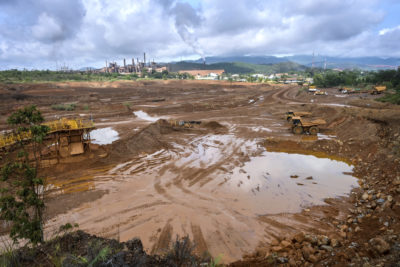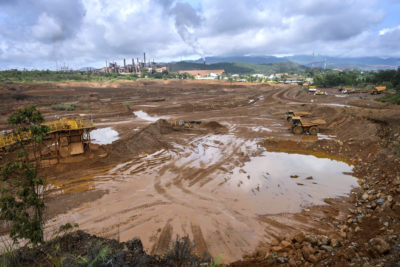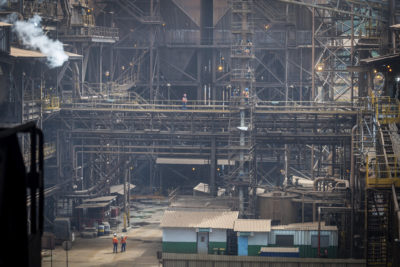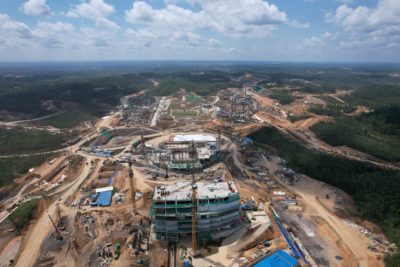
Will Indonesia’s New Regime Mark the End of Gains for Its Forests?
Indonesia, the world’s fourth most populous country with the third largest surviving area of tropical forests, has a new strongman president. Environmentalists are concerned. They fear that, after a decade during which the country’s deforestation rates have fallen by almost two-thirds, Prabowo Subianto will unleash a new ecological orgy, cutting, burning, and despoiling some of the world’s greatest rainforests.
The 72-year-old former military man, who first rose to prominence under the country’s late-20th-century dictator President Suharto, was elected by a wide margin in February and will take office in October. He has promised to double GDP growth through expanded mining and industrial development.
Indonesia is already in the midst of a mining boom. It produces half the world’s nickel, a metal vital for the batteries used in electric vehicles. The International Energy Agency says that Indonesia could up its share of total supply, while demand for the metal expected to double by 2040.
Nickel will help other countries reduce their greenhouse gas emissions. But it does the opposite in Indonesia, where most of the metal is mined from beneath rainforests and is refined using energy from coal-burning power stations. On the Indonesian island of Sulawesi, over a third of the forests now lie within nickel mining concession areas, according to a study published this month by Mighty Earth, a global advocacy group with offices in the country.
Prabowo will enter office with the support of many of the country’s industrialists and backed by a popular mandate.
Now Prabowo wants to expand mining and refining further. “By processing our natural resources domestically, I’m optimistic that we would be able to witness double-digit economic growth,” he said shortly before the election.
But at what price for the rainforests? Some environmentalists fear the worst, as mines and refineries proliferate. But there are optimists who argue that the Western investors and manufacturers that Prabowo will need to fulfil his economic promises could leverage more sustainable development. “Nickel mining is a dirty industry,” says Amanda Hurowitz, who runs Mighty Earth’s program for protecting forests from commodity trades, “but with the political will, Indonesia can clean up the nickel supply chain.”
Under departing president Joko Widodo, Indonesia has often been seen as an environmental success story. Jokowi, as the one-time slum-dwelling carpenter is widely known, slowed forest loss dramatically by banning rapacious palm-oil and pulp companies from receiving new licenses for forest clearance. He also looked to restore nature and suppress forest fires by rewetting millions of acres of peat swamps that had been drained for failed agricultural and forestry projects.
A nickel mine in Soroako owned by PT Vale Indonesia, the country’s largest nickel producer. Hariandi Hafid / SOPA Images / Sipa via AP Images
But the gains are fragile. Indonesian annual forest losses remain the fourth largest in the world, with an uptick in deforestation last year. And the effectiveness of the peat rewetting has been questioned after the Gecko Project, a nonprofit investigative news service, found that more than a quarter of the supposedly restored swamps do not meet the government’s criteria for raised water levels. Many continue to be plagued by fires.
Enter Prabowo. He has long had a troubling reputation, both as the owner of a coal-mining company in Borneo and for historical human-rights abuses.
As a protégé and son-in-law of Suharto, he commanded a military unit that in 1998 kidnapped 22 anti-Suharto student activists, 13 of whom remain missing to this day. After Suharto’s overthrow, he was dishonorably discharged from the military, spent time in exile, and remained banned from entering the United States until Jokowi appointed him Indonesia’s defense minister in 2019.
During the election campaign, Prabowo appeared to have the support of Jokowi, who did not make a formal endorsement, but whose son Gibran Rakabuming Raka was Prabowo’s running mate and now is vice president-elect. But analysts and NGOs are concerned about Prabowo’s past record. “He does not appear to have changed,” says Atina Rizqiana of the Center of Economic and Law Studies, an Indonesian think tank. Mighty Earth’s Hurowitz agrees, noting, “His associations with human rights violations, democratic infringements, and environmental issues carry great implications for Indonesia.” Nonetheless, Prabowo will enter office with the support of many of the country’s major industrialists and backed by a popular mandate.
Indonesia is the only one of the world’s top 10 greenhouse-gas emitters to be still increasing its reliance on coal for power.
Indonesia is already a major mining hub, with a footprint to match. Mining recently became the country’s biggest current cause of deforestation, exceeding palm oil. A recent global study found that the country is responsible for 58 percent of all tropical forest lost to the direct impact of mining between 2000 and 2019. To date, most of this loss has been to coal mines in Borneo. But nickel mining has been catching up fast.
Nickel has long been an important component of stainless steel. But because it has become essential to the lithium-ion batteries that power most electric vehicles, global demand is now soaring. A typical vehicle battery contains 56 pounds of the metal.
Almost three-quarters of the 329 Indonesian nickel concessions are in forest regions, many operating potentially illegally within protected areas. The mines have cleared some 290 square miles. The rate of loss more than doubled between 2020 and 2023, according to Mighty Earth, which estimates that an additional 1900 square miles of forest lies within existing nickel-mining concessions.
Most of the nickel mining in Indonesia is carried out by companies based in China, the world’s largest manufacturer of vehicle batteries. The threat is not just the mines. Since 2020, Jokowi has banned the export of raw Indonesian nickel ore, requiring that it be refined domestically. Chinese companies have rushed to sign deals to run this industry too.
But the result has been a further round of environmental degradation. Most Indonesian nickel ores are shallow, laterite deposits that can be strip-mined cheaply, but are low-grade. Refining them is both dirty and energy intensive. Besides often despoiling forest ecosystems, the 200-plus nickel refineries are mostly powered by dedicated off-grid coal-fired power stations — in spite of a 2021 promise by China to end investment in coal power plants overseas.
So, many of the batteries sold around the world with the aim of diminishing the emissions of road transportation have a huge and largely unassessed carbon footprint long before they hit the road.
Indonesia is the only one of the world’s top 10 greenhouse-gas emitters to be still increasing its reliance on coal for power. Largely as a consequence, the country’s emissions rose by 21 percent in 2022, according to Climate Action Tracker.
Prabowo has promised to reduce coal’s role in energy production. But environmentalists are wary. For he plans to achieve this by replacing fossil fuels with biofuels, especially palm oil for burning in power plants and blending with diesel for vehicle fuel. Growing palm oil will likely require taking forest land for the new energy crops, says Andi Muttaqien, executive director of Indonesian environmental NGO Satya Bumi. Plans for biodiesel alone will cause 2,880 square miles of deforestation, he estimates.
Investors in Indonesia’s dash for growth may not be willing to underwrite headline-grabbing environmental devastation.
Another red flag for the future, says Hurowitz, is the huge number of national infrastructure projects initiated by Jokowi. They include a new capital city, Nusantara, being built in a former coal-mining area of eastern Borneo; and thousands of miles of major highways gouged through forests. Many of these strategic highways are partly inside national parks and Indigenous lands.
Jokowi’s time in office also saw an upsurge in smaller, often unmapped roads, carved out of the forests by miners, loggers, and farmers. William Laurance and Jayden Engert, ecologists at James Cook University in Australia, this month reported that Indonesia’s most forested provinces had 74 percent more roads than recorded in official data, and up to six times more than those shown on the best published maps. These “ghost roads,” says Laurance, “are among the gravest of all direct threats to tropical forests.”
Jokowi’s legacy is decidedly mixed. Conservationists fear that while reining in deforestation in the short term, he has primed forested regions for a new upsurge of ecological loss that Prabowo’s policies seem set to unleash.
Muttaqien says an early test case of Prabowo’s intentions for rainforests will be how he treats Mayawana Persada, a shadowy pulp company registered in the British Virgin islands, a notorious tax haven. Its ultimate ownership is unknown, but the company has gained a reputation as the country’s largest deforester.
PT Vale Indonesia’s nickel processing plant in Soroako. Hariandi Hafid / SOPA Images / Sipa USA via AP Images
NGOs say Mayawana Persada cleared more than 60 square miles of Borneo forests in 2023 alone, including carbon-rich peatlands, orangutan habitat, and Indigenous-owned forests. Last month, following an exposé by Greenpeace and others, the Jokowi government issued an edict halting the clearances. The question now is whether the bulldozers will start again under a new president.
A second important test of Prabowo’s environmental credentials, says Muttaqien, will be how he deals with the grosser fallout from the nickel-mining boom, in particular an increasingly well-publicized environmental and human-rights scandal on Kabaena island off Sulawesi.
The homes and fishing grounds of local seafaring Bajau people, who are renowned for their ability to dive underwater for 10 minutes without taking air, are being engulfed by muddy, toxic, nickel-contaminated waters flowing from mines. Will the new president see their plight as collateral damage in his drive for economic growth — or will he call a halt to the pollution?
He may have more pressure to take action than at first appears. Investors in Indonesia’s dash for growth may not be willing to underwrite headline-grabbing environmental devastation; and auto manufacturers with brand reputations to defend may not want to buy nickel pillaged from the rainforests at the expense of local inhabitants.
Western automakers need to insist on zero deforestation in the production of nickel for their car batteries, activists say.
Robert Blake, U.S. ambassador to Indonesia from 2013 to 2016 and now a trade consultant, says that securing foreign investment, especially from the U.S. and Europe, will require Prabowo to insist on environmental improvements. In this way, “the Prabowo government has an important opportunity to improve social and environmental standards.”
Some activists agree that external pressure can work, noting that at least one mining company, TBP, which operates on Obi Island in the Molucca Sea, has adopted a no-deforestation policy.
Others wonder if Western companies are still the power in Indonesia that they once were. Indonesia is increasing the cockpit of a battle between the U.S. and China over economic influence in Southeast Asia. Prabowo has shown early signs of tilting towards Chinese investors, who have until now been less concerned about environmental issues. Only days after being declared the winner of the presidential election in March, he flew to Beijing, where he discussed future investment prospects with President Xi Jinping.
But Hurowitz says a Chinese ascendancy in Indonesia may not be all bad news for the nation’s forests. “While China may not be an environmental leader, it doesn’t want to be an environmental laggard,” she says.
The presidential palace under construction in the new Indonesian capital, Nusantara, last September. Dimas Ardian / Bloomberg via Getty Images
One reason is that Western markets remain vital for Chinese products. The major Chinese companies investing in Indonesian nickel mining and refining — such as the Tsingshan Group, the world’ largest nickel producer — supply major Western car brands such as Ford, Volkswagen, and Tesla. In 2022, Tesla signed a $5 billion deal to buy nickel for its batteries from Tsingshan’s giant nickel-processing complex in the 10,000-acre Morowali industrial park on Sulawesi.
Many of these Western automakers have committed to achieving carbon-neutral supply chains. To avoid fatally undermining those promises, they need to insist on zero deforestation and zero coal-burning in the production of their nickel, activists say.
Similarly, Apple, which has committed to a carbon-neutral supply chain by 2030, is reportedly set to become an important “smart city” investor in the new capital, Nusantara, following a meeting between Jokowi and Apple CEO Tim Cook this month. Apple, too, could leverage environmental gains, activists note.
Indonesia’s new capital is set for inauguration in August this year, in the heart of a former rainforest that succumbed to palm-oil growers and coal miners. But when Prabowo moves into the new presidential officers there soon after, the fate of Indonesia’s remaining rainforest — the world’s third largest — will still be very much in the balance.
Services Marketplace – Listings, Bookings & Reviews


